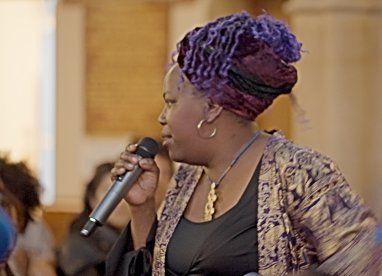From relief for anxiety to finding community and being present in the moment, music in all its shapes and forms can have a transformative effect on people’s mental health and wellbeing. Three local practitioners share their insights.
“Music is healing,” said Prince, “music holds things together.” Indeed it’s hard to imagine how anyone’s wellbeing could endure without music. It helps us to unwind, it can make us feel confident and it can get us into a party mood.
On the flip side, music has been proven to help with depression, anxiety and even dementia. In 2022, a meta-analysis of multiple studies suggested that music can provide a clinically significant boost to mental health – putting it in the same ballpark as exercise and weight loss. To find out more, we spoke to three music practitioners working in West Sussex, each offering a different perspective on the benefits music can bring.
Dominique Le Vack works with Waves Music Therapy to run workshops across the south-east. She encourages participants to delve into her “treasure trove” of instruments – including percussion, drums, ukuleles and Tibetan bowls – to explore making sounds as part of an open-ended collaboration.
“I do group improvisations which are free-flowing, often non-rhythmical, pieces of music that can go anywhere. People can take the lead or they can sit back and it ebbs and flows and there's no right or wrong. So whatever people bring on the day is perfect. There's no judgement. There's no expectation. People experiment with different instruments and they find one that they like, and then we're away.”
Going beyond possibility and the here and now
In Dominique’s work, the emphasis is about joining in and overcoming personal barriers. It’s a process she clearly finds rewarding. “It's probably the best job in the world!” says Dominique “And that's mainly because you see people discovering music, there and then. They are discovering their abilities and going beyond the realms of what they thought were their own possibilities. I see it every time we do a session and it's just glorious. They always feel better, calmer, less anxious.” In addition, music therapy offers a safe environment in which participants can become fully immersed in the moment – a kind of meditative state that you’ll hear musicians refer to as “being in the zone”.

“People can get affected by the frequencies of the notes,” explains Dominique. “And they can get lost in their own little world. It's sort of a bit like time travelling: you just don't realise how long you've been doing it because you’ve been so absorbed in it. Of course, anxiety lessens its grip on you when you're absorbed in something creative. Only here and now matters. Just this. Everything else drops away.”
Singing for wellbeing and community
For Siggi Mwasote, a gospel singer and vocal coach, music is innately connected to wellbeing. Her choir, Spring into Soul, has been running in Worthing for 15 years and now attracts up to 50 singers each term.
“I think it has a positive benefit for everyone,” says Siggi. “I've seen pregnant mums that come in and they get the physical benefits of breathing in a very directional way. I’ve had people with a cancer diagnosis who are actually experiencing treatment and they come for stress relief. At the moment one of my choir members has dementia and they struggle with day-to-day tasks, but singing they can do! It makes them feel good and it makes them feel capable and present in the world. It's for everyone really. It’s for people who just love to sing…”

The choir is open to all comers, with or without previous experience, who will typically attend regular rehearsals and then perform at end-of-term concerts. This process of singing together, while working towards a shared goal, seems to be a great way of countering mental health issues associated with isolation and social anxiety. Siggi has seen first-hand how Spring into Soul has brought people together.
“People form friendships with people they would never have met anywhere else, and that's something I really love about my choir. We’ve had people who have started their families in the choir, people who've found house mates, people who've found best friends. It's actually a real community resource and we look after each other.”
“Getting things off your chest”
Among its many community connections, Spring into Soul recently collaborated with a local musical charity for young people. Based in Worthing and Brighton, AudioActive provides accessible projects to support young and emerging artists across Sussex. Alongside their regular events, the organisation runs two lyric-writing workshops called Vocalise and Room to Rant, for young women and men respectively, with trans and non-binary people welcome at both.
“The idea is that you come to get things off your chest,” says Nicholson Davids, a project co-ordinator with AudioActive. “At the sessions we check in with each participant, ask how their week’s been, see where their mental health’s at. Then usually we'll set a task that’s loosely based on some of the challenges or topics that have come up. Young people tell us it feels good when they know that they've written lyrics specifically about their situation, and they go off feeling much better. That's usually the outcome.”

“I can think of a young lad I worked with whose trajectory was pretty wild, his trajectory was prison basically. He was dealing with some really tough mental health challenges. But it wasn’t until he’d been coming to us for three or four months that he started to speak and rap about his background and the difficult relationships in his life. And you could just see it. The pent-up anger, and the anxiety that he was feeling on a daily basis, started to subside ever so slowly. I bumped into him not too long ago and he's now got a job. That might sound normal to most people, but it was huge for him.”
Hubs of the community
Like Siggi’s choir, these groups often serve as hubs of the community. Nicholson believes this means they can play a key role for young people with mental health challenges: “I’ve heard feedback from lads at Room to Rant who say that they've attended countless CAMS sessions, or they've been on the waiting list for NHS mental health support, or that they've been to private therapy, and none of it worked – but what has been so good at Room to Rant is the community that they’ve found.
“You know, having a lot of young people in the same place, in the same physical place, as well as the same mental place. And that's been huge for building people's confidence, which is great.”
Of course, all of these benefits hinge on the music itself. AudioActive is clear about doing music for music’s sake, and Spring into Soul prides itself on the quality of its singers. But what’s most important, it seems, is the sheer pleasure of making music.
“It's a very active experience,” says Siggi. “We sing loudly but we also move a lot. And there's a lot of joy. I believe that music is medicine. You can do as much of it as you possibly want and all it can do is good.”
If you are struggling with your mental health, find local sources of support on this website